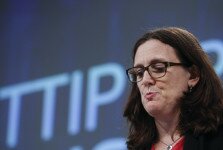One of Africa’s richest businessmen, Tony Elumelu, has launched a $100 million program to support and promote entrepreneurship across the continent. Elumelu, the chairman of Nigeria-based pan-African investment group Heirs Holdings and founder of the Tony Elumelu Foundation, describes the initiative as “a $100 million endowment to encourage the maturation of African entrepreneurs.”
The program, which Elumelu first discussed publicly on the sidelines of the August 2014 U.S.-Africa Leaders Summit in Washington, is intended to help up to 10,000 budding African entrepreneurs to develop their ideas into sustainable businesses.
The foundation plans to provide 1,000 entrepreneurs a year for the next 10 years with seed capital of $5,000 and additional returnable capital of up to $5,000.
By making half of the money returnable, Elumelu hopes to encourage program participants to develop a sense of responsibility. “I want to make sure there is some spirit of accountability,” he says.
In order to be eligible for the initial $5,000 seed capital, successful applicants will have to go through a 12-week online mentoring and training program.
Parminder Vir, director of the entrepreneurship program, explains: “The business skills training program will give them tools they need to go out and physically implement the lessons they learn.”
The online program will draw on content specifically designed to address the challenges African businesses will face. “During that stage they will have mentors to help them, as well as access to a curated online library to enable them to find information that is relevant to their business,” Vir adds.
At the end of the 12 weeks, the 1,000 startups will attend a three-day forum in Nigeria. “That event will sow the seed for intra-Africa trade, for pan-Africa trade,” she says.
For Elumelu, promoting the long-term growth of intra-African trade is one of the key goals of the project. “Intra-African trade is quite low, partly because Africa was wired from colonial times to facilitate trade only with the rest of the world, and partly because of the nature of what we’re trading. We have raw materials but we don’t have the processing capacity to transform them into products that will be useful in Africa.”
The relatively low level of trade between African countries is considered one of the key factors holding back the continent’s economic development. According to a recent study,sub-Saharan Africa has the lowest level of connectedness of any regionworldwide.
“We hope that the successful entrepreneurs in this program will show interest in industrialization of the continent,” Elumelu says. “That will help us produce more finished goods, which will encourage trade and also put pressure on political leaders to create economic zones, or to enable the movement of goods, people and payments that will facilitate intra-African trade.”
Elumelu and Vir believe that the long-term nature of the program will also help ensure the participants make the connections that will help them build pan-African businesses. “Over the 10 years we will build an alumni network…that will lay the foundations for generations to come,” Vir says.
Wiebe Boer, CEO of the Tony Elumelu Foundation, says he hopes the businesses supported by the program will create at least one million new jobs and generate $10 billion of new revenues.
Beyond the promise of receiving financing, mentoring and support, entrepreneurs have an additional incentive to apply: The chance of having their business noticed by Elumelu as a potential investment opportunity.
“Heirs Holdings is pan-African private investment company. If we see very promising companies that need support, we can do that—through impact investing, through pure commercial investment, through financial support, or even through wider capital raising,” he says.
Elumelu acknowledges that the program is ambitious, both in its scale and complexity, and that it’s unlikely all the entrepreneurs who join will emerge with successful businesses. “If we achieve 30%-50% success rate we will have helped significantly in helping the development of the continent,” he adds.
The application process will begin in January 2015 with the announcement of the first 1,000 participants expected by the end of March.





